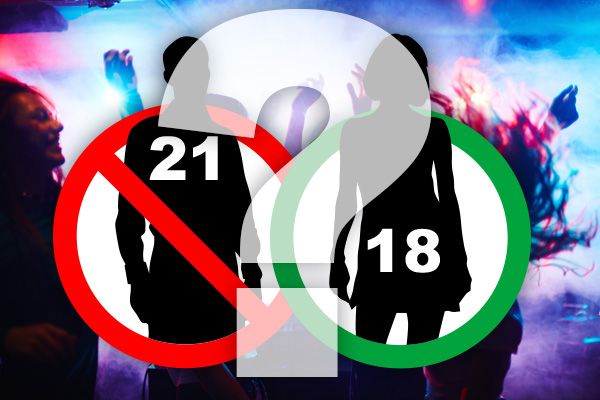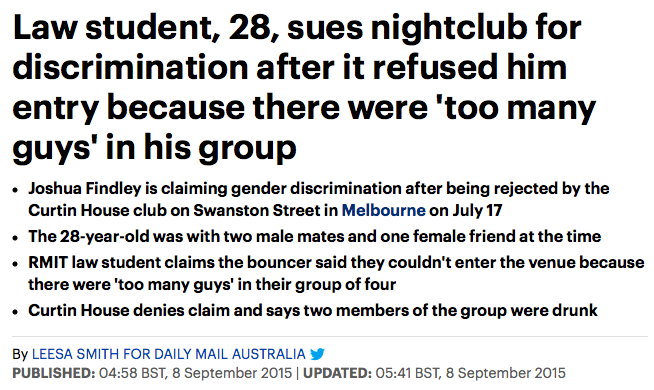

New multi-ground discrimination legislation being considered by the States could mean local nightclubs would legally need to bring their age entry requirements in line for all genders, breaking a tradition for some where women can enter at 18 but men can't until they are 21.
The committee for Employment & Social Security is currently working on new discrimination legislation for the island, and as it stands, it is considering extending the development to allow it to cover additional areas.
The aim of the committee is to develop discrimination legislation which covers goods and services alongside employment, which was the original area targeted, and the only area covered by the 2005 ordinance that makes discrimination unlawful in Guernsey.
 Several Guernsey nightclubs and bars have had a long time entry requirement of women being 18 and men being 21.
Several Guernsey nightclubs and bars have had a long time entry requirement of women being 18 and men being 21.
Recently, a group of young people raised concerns about nightclubs discriminating against people by allowing women in to their establishments at a younger age then men. At the time, the States said there were no parts of Guernsey law that saw this as discrimination, despite similar cases in the UK being treated as such.
But this could change under the new legislation.
"The Committee for Employment & Social Security are seeking to develop discrimination legislation which covers goods and services provision as well as employment. This would mean that all service providers, including night clubs, would need to ensure that their business practices were inclusive and non-discriminatory," a spokesperson for the committee said.
"In this case, unless an exception were made an admissions policy which treats people differently on the basis of their gender or sex would be considered discriminatory. The Committee has not yet considered exceptions. Exceptions would generally only be made to permit the different treatment of individuals on the grounds of a protected characteristics in well justified circumstances (for example the sale of alcohol to minors).
"If the States agree to make this legislation multi-ground it will cover sex or gender discrimination in goods and services provision."
 Above: One of many news articles detailing people suing nightclubs with discrimination cases, allowed in the UK because of tighter legislation, similar to that that Guernsey could implement.
Above: One of many news articles detailing people suing nightclubs with discrimination cases, allowed in the UK because of tighter legislation, similar to that that Guernsey could implement.
Currently, Employment & Social Security are asking for feedback on this and the expansion of the grounds of the legislation in general.
As part of the Disability and Inclusion Strategy, the Committee has been working with the National University of Ireland Galway to identify a model to base Guernsey’s disability discrimination legislation on. It was recently decided that the new law would be based on Australian and Irish laws. These Irish laws being considered cover multiple grounds of protection.
"We believe that it would be both fairer and more efficient in the long run to produce one piece of legislation covering several grounds of protection at once than undertake a series of projects to introduce new grounds individually, which would extend over a number of years," Deputy Michelle Le Clerc, President of the committee, said.

"In February 2018, the States made a commitment to develop legislation to prevent age discrimination. We already have an ordinance which makes discrimination unlawful on the grounds of sex, gender reassignment, marriage and maternity leave or adoption leave in employment – consideration would need to be given as to whether to replace this or incorporate parts of it in a single new ordinance.
"We believe that discrimination on other grounds, such as race and sexual orientation, needs to be made unlawful, it’s just a question of when. It’s morally the right thing to do to protect people’s fundamental human right not to be discriminated against. Combining the work would allow us to develop a single consistent Equality Ordinance."
In wider applications, the legislation would mean employers could not make decisions based on protected characteristics.
"We recognise that this could be a significant development for businesses when the law is introduced. However, we’ll ensure that we consult with the public and businesses carefully before returning proposals to the States," Deputy Le Clerc added.
"If the ordinance does cover multiple grounds of protection, there’d be an option to bring sections of it into force in a phased way if people needed time to adapt their business processes to be compliant. We could make this decision at a later date."
Interested parties are invited to contact the Committee by the 25 May to express their views on broadening the scope of the project via email (employmentandsocialsecurity@gov.gg), or in writing to:
Discrimination Legislation, Policy Projects, Level 4, Edward T Wheadon House, Le Truchot, St Peter Port, Guernsey, GY1 3WH.
Comments
Comments on this story express the views of the commentator only, not Bailiwick Publishing. We are unable to guarantee the accuracy of any of those comments.